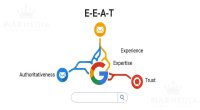Google`s AI Overviews and the New Rules of SEO
Is SEO dying with Google's AI Overviews? Here are 6 critical strategies you need to know to avoid losing traffic and become a leader in this new era. You will find answers to all your questions related to topic Google`s AI Overviews and the New Rules of SEO in the continuation of the text.

How Will Google AI Overviews Change SEO? A Survival Guide for 2025
What Exactly Are AI Overviews and How Do They Work?
The "Zero-Click" Threat: Who is at Risk, and Who Will Seize the Opportunity?
Content Types at Highest Risk:
Content Types That Hold New Opportunities:
Survival and Growth Strategies for 2025: The New Rules of SEO
Conclusion: Don't Fear, Adapt, and Lead
The world of search engine optimization (SEO) is on the verge of the biggest and most disruptive transformation of the last 20 years. The search engine results page of 10 blue links that we've been accustomed to for years is gradually giving way to a smarter, more conversational, and more direct interface: Google AI Overviews.
How Will Google AI Overviews Change SEO? A Survival Guide for 2025
With Google's new technology, the critical question on every business owner's and marketer's mind arises: If Google itself provides the answers directly, who will click on websites, and why? Is this a challenge that rewrites the rules of digital marketing, or is it a unique opportunity for those who understand the game?
In our comprehensive guide, we will cover in full detail what AI Overviews are, how they will radically change SEO strategies, and most importantly, how you can not only survive but also become a leader in the new era of 2025 and beyond.
What Exactly Are AI Overviews and How Do They Work?
AI Overviews is a feature where Google uses its Gemini AI model to generate a direct and comprehensive summary answer to a user's search query. Google no longer just gives you a list of links; it reads the information in those links for you, synthesizes it, and presents it at the very top of the search results page in an easy-to-digest paragraph or list. You can read more about the vision behind this technology on Google's own blog.
With a simple analogy: Google is acting like a personal research assistant who reads the top 5 articles for you, takes notes, and presents you with a summary created from those notes. The best part is, it also cites the sources of the information it used in the summary—that is, the links to the websites.
The system is especially designed for complex or multi-step questions. For example, for a query like "how to prepare a lunchbox for my child that is both healthy and practical?", AI Overviews can combine recipes, health tips, and practical advice from different blogs into a single answer.
The "Zero-Click" Threat: Who is at Risk, and Who Will Seize the Opportunity?
The rise of AI Overviews means that "zero-click searches" (searches where the user gets their answer without clicking on a website) will increase. While this poses a serious risk of traffic loss for some content types, it creates new opportunities for others.
Content Types at Highest Risk:
- Simple and Factual Queries: Questions with a single, clear answer, like "How high is Mount Everest?" or "How many TRY is 1 dollar?".
- Superficial Definitions and Lists: Simple definitions like "What is SEO?" or lists like "Top 10 horror movies." AI can easily generate these types of lists itself.
- Step-by-Step Instructions: Content with simple, standard steps, like "How to tie a tie?".
Content Types That Hold New Opportunities:
- Deep Expertise and Real Experience (E-E-A-T): The most important thing AI cannot replicate is your personal experience. Content like, "We tested 5 different project management tools in our agency, and here are the real-world results..." will always be valuable.
- Complex Analysis and Original Commentary: In-depth analyses comparing two different products, expert commentary on market trends, or content that reflects your brand's unique perspective.
- - Niche and Long-Tail Topics: Detailed content that addresses a very specific problem, caters to a niche audience, and satisfies the correct search intent will always be more valuable than the AI's generic answers.
- Strong Brand and Community: Businesses that have built a following and community, causing people to search directly for their brand (e.g., "Piar Medya SEO services").
Survival and Growth Strategies for 2025: The New Rules of SEO
Yes, the most important question: How will we adapt to the new order? Here is Piar Medya's recommended SEO roadmap for 2025 and beyond:
- "Be the Source of That AI Answer": This should be the primary goal. Produce content on your topic that is so comprehensive, so well-structured, and so trustworthy that Google's AI has to cite you as a source when generating an answer. This is now a more valuable goal than just being rank #1.
- Stand Out as a Brand: Don't be just a website; be a brand. Make people search for "Adidas running shoes" instead of "best running shoes." Strengthen your brand awareness through other channels like social media and email marketing.
- Prove E-E-A-T, Don't Just State It: It's not enough to say, "we are experts." Add author bios. Publish real success stories (case studies). Display customer reviews. Present original data and analysis. Prove your expertise.
- Double Down on Structured Data (Schema Markup): Give Google's AI technical clues to help it understand your content more easily. Using detailed schema code for your products, services, articles, and business increases your chances of being correctly cited by the AI. Google's own documentation is a great resource for all your questions on this topic.
- Offer an Experience, Not Just Information: Your website must offer a reason to click through after seeing Google's summary. That reason could be an interactive tool (like a calculator), a special video series, a downloadable e-book, or a vibrant community forum. Turn your site into a destination.
- Invest in Video and Visual Content: AI answers are often text-heavy. YouTube is now more important for SEO than ever. High-quality videos explaining your topic and infographics that summarize information can help you stand out in the search results.
Conclusion: Don't Fear, Adapt, and Lead
Yes, Google's AI Overviews feature is changing the rules of the game. The era of superficial, copy-pasted content produced "just to rank" is coming to an end. Of course, it should be noted that the journey will continue for producers of high-quality and helpful content.
The new era will reward the businesses that produce the most "helpful content," invest in their brand, and offer genuine expertise. Those who understand the change and adapt their strategies accordingly, rather than fearing it, will be the leaders of the future digital world.
In conclusion, during this complex and exciting period of transformation, working with an SEO agency like Piar Medya, which is proficient in the most current strategies, is the best investment you can make for your brand's future. You can get a quote for a free analysis now.






